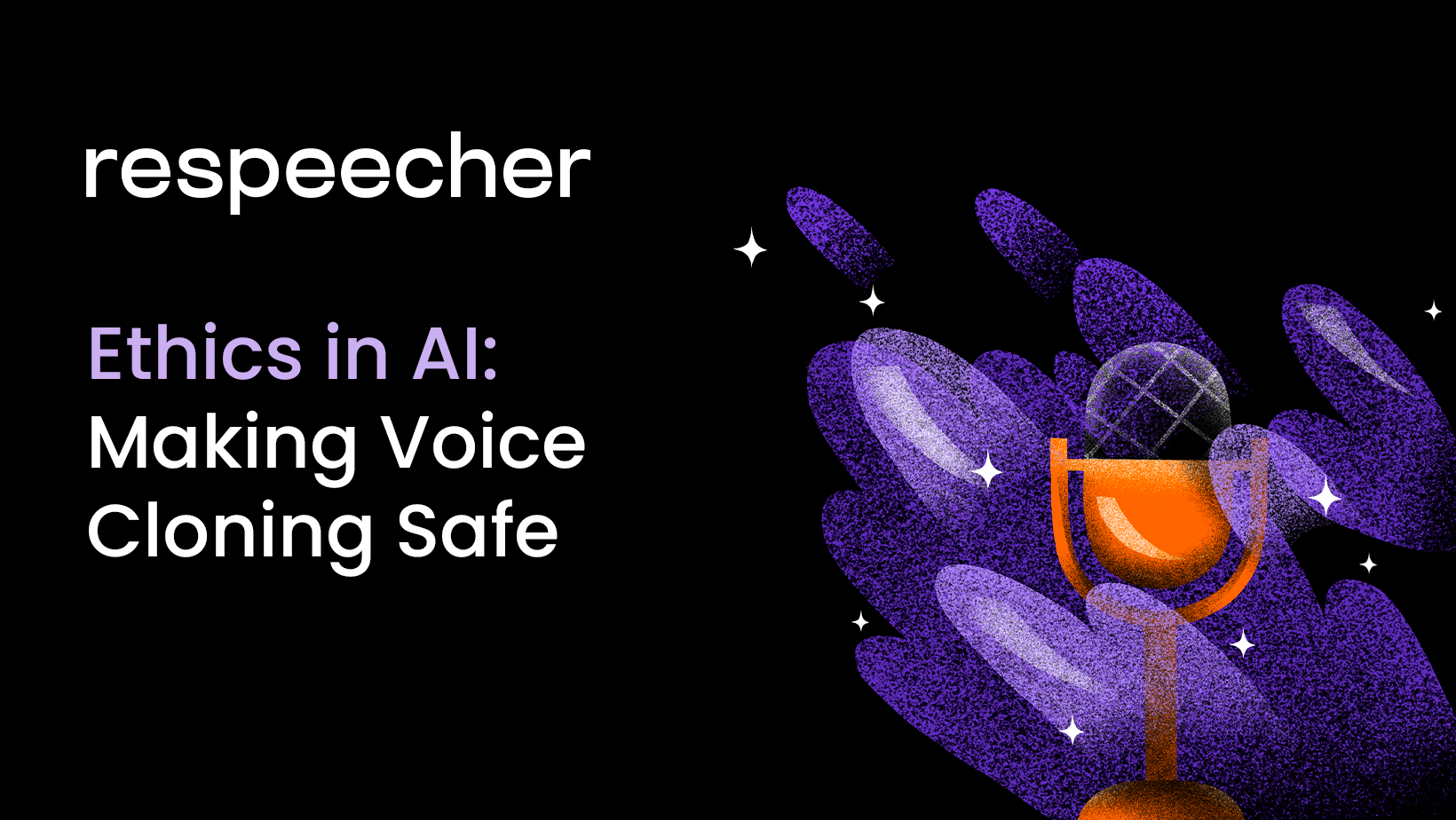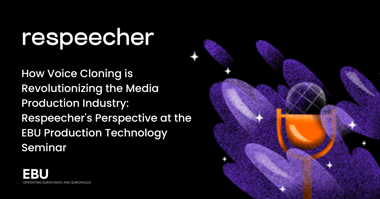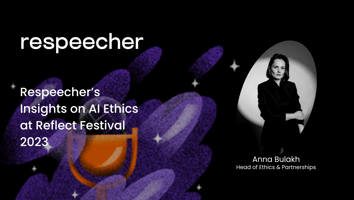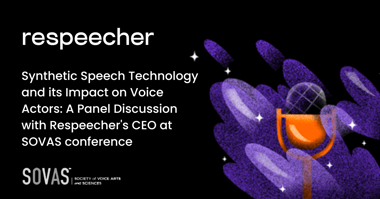Ethics in AI: Making Voice Cloning Safe
Apr 9, 2024 10:41:08 AM

In this article, based on the Production Expert podcast with the participation of Anna Bulakh, Respeecher's head of ethics, we'll discuss the emergence and implications of AI-generated content. Respeecher can mimic voices, allowing one person to speak in another person's voice. In the Mandalorian series, this technology has synthesized AI voices for characters like young Luke Skywalker and Darth Vader.
The conversation delves into the ethical concerns surrounding this technology, such as the potential for historical figures or public personas to be cloned. There are two methods of voice generation: speech-to-speech and text-to-speech. Respeecher focuses on speech-to-speech, aiming for hyper-realistic voice cloning by preserving the performance and accent of the original speaker.
We would also expand on ethical considerations and the potential misuse of AI-generated content. Concerns exist about identity theft, defamation, and the broader social impact of spreading misinformation using AI tools such as voice changers or voice generators.
What is Voice Cloning?
Respeecher's cutting-edge technology revolutionizes how we perceive voice communication by enabling people to speak in another person's voice. Recording a digital replica of the target voice typically takes two to thirty minutes depending on the desired quality. This recording serves as the foundation for creating the voice model, ensuring an accurate and seamless replication.
With a keen focus on achieving natural performance, the technology excels at capturing the nuances of speech, including intonation, rhythm, and other subtle nuances that make each voice unique. By seamlessly transferring these characteristics into another voice, Respeecher delivers unparalleled authenticity and realism.
However, it's essential to recognize the ethical considerations involved in this technology. Since AI utilizes biometric data to create these digital replicas, obtaining consent and permission from the individuals involved is paramount. This ensures that privacy rights are respected, and the technology is used responsibly.
AI voice cloning presents exciting opportunities for various industries. For actors, it offers a novel avenue for monetization, allowing them to sell the rights to use their voice for various purposes. This can be particularly beneficial in scenarios where actors may not physically fit a role but possess the perfect voice for the character.
Additionally, studios and content creators stand to benefit significantly from AI-powered voice cloning. By leveraging these advanced models, they can streamline the production process, saving time and resources on tasks such as voiceovers for audiobooks or generating content for various media platforms. This efficiency enhances productivity and opens up new creative possibilities in storytelling and content creation.
What are the potential threats?
With voice cloning, there is a potential threat that your identity can be stripped from you and can be used to defraud you or defame you using your identity line, which can affect your reputation. That's why it's vital to differentiate synthetic media from deepfakes because synthetic media determines the broader application of this technology that can be used positively in the entertainment industry or even in medicine when people who, for example, have undergone operation and lost their voices.
According to Anna Bulakh for Production Expert, "it's essential to understand that this technology can both be used positively and negatively. Then, we understand how to mitigate this potential negative use of technology when it comes to developing and unleashing this technology for public use. It's about how we build in the workflow of our product development. When we onboard our users to make sure that they have permission for voice that won't replicate. It's not only to make it like providing permissions to the owner of your voice because if your owner voice and you want to monetize it, it's totally okay".
What does Respeecher do to protect voice owners?
Respeecher provides services to train the voice model. This means that we do not own this voice, but the project owner who comes to us to use it must provide permission.
Respeecher operates within a framework of transparency and ethical responsibility in navigating the intricacies of voice ownership and usage rights. This involves facilitating negotiations between project owners and voice owners to ensure that compensation agreements are fair and mutually beneficial. Should the voice owner wish to withdraw from a project, their decision is respected, and alternative arrangements are made accordingly.
Furthermore, Respeecher recognizes the importance of protecting actors' interests, particularly those involved in voice acting who are part of unions or professional organizations. By adhering to industry standards and regulations, Respeecher ensures that voice actors receive proper compensation and that their rights are safeguarded throughout the process.
Conclusion
The discussion surrounding ethics in AI, particularly in AI voice cloning technology, reveals both the remarkable capabilities and potential risks associated with such advancements. As demonstrated by Respeecher, voice cloning technology offers the ability to mimic voices with hyper-realistic precision, presenting opportunities for various applications, including entertainment and content creation.
However, significant ethical concerns exist alongside these possibilities, particularly regarding identity theft, defamation, and the misuse of synthesized content. To address these challenges, it is crucial to establish clear ethical guidelines and practices within the industry. Respeecher's approach emphasizes obtaining consent and permission from voice owners and their families, ensuring proper compensation and control over the use of digital replicas.
By prioritizing transparency, accountability, and user consent, Respeecher strives to mitigate potential risks and promote the responsible use of voice cloning technology. Also, the collaboration between technology developers, industry stakeholders, and regulatory bodies is essential in shaping the ethical framework surrounding AI-generated content. We invite you to listen to the podcast episode to find out more.



